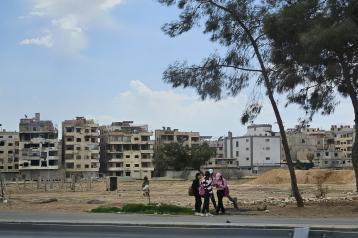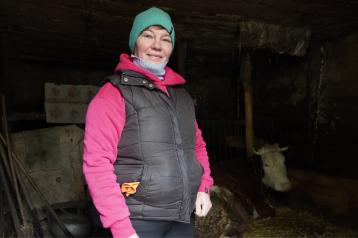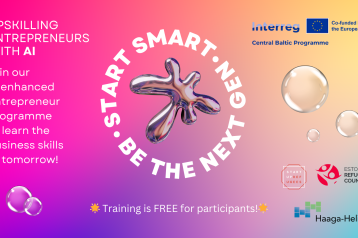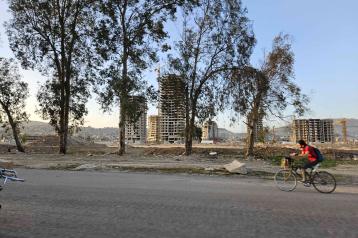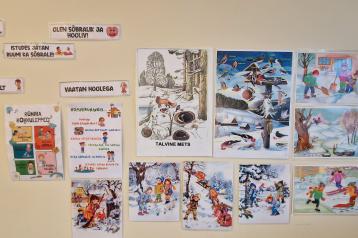In 2024, the Estonian Refugee Council operated in Ukraine, Estonia, Armenia, Georgia, Jordan, and Lebanon, providing immediate assistance in emergencies and supporting more than 69,000 crisis-affected people in rebuilding their lives.
Ukraine
We supported people affected by the war with multi-purpose cash assistance, helping those living in frontline areas to purchase food, medicine, hygiene products, and other essentials. Last year, our multi-purpose cash assistance reached nearly 39,000 people.
We provided winter heating aid to more than 14,000 people. We provided both financial and in-kind support to people living in frontline and hard-to-reach areas to help them cope with rising heating costs and secure heating materials for the winter.
At the beginning of 2024, we supported more than 200 families with our shelter repair programme, helping them carry out minor repairs to restore their war-damaged homes. We supported the reconstruction of houses in frontline areas in the Zaporizhzhia, Donetsk, Kharkiv, and Kherson regions.
We offer war-affected women the opportunity to participate in entrepreneurship programmes to develop or establish a sustainable and crisis-resilient microbusiness, helping over 360 women in 2024.
We supported nearly 3,900 people in the Kirovohrad, Poltava, Cherkasy, Kharkiv, Mykolaiv, Zaporizhzhia, Dnipropetrovsk, and Donetsk regions through an emergency livelihoods assistance programme. This aid helps people start or continue their businesses to achieve self-sufficiency. Through the programme we support activities related to agriculture, livestock farming, food production, and various services.
Through our winterisation livelihoods support programme, our assistance reached more than 1,600 people, helping livestock farmers in the Kharkiv, Mykolaiv, and Zaporizhzhia regions.
We are part of the Joint Market Monitoring Initiative (JMMI), through which we assist the humanitarian community in maintaining a consistent overview of market conditions and the price levels of essential goods in Ukraine. Through JMMI, we can better prepare our cash-based assistance programmes and direct them to the areas where help is most needed. Our data collection scope covers the Zaporizhzhia, Kherson, and Donetsk oblasts.
In 2024 ERC’s activities in Ukraine were supported by the European Union, the USAID’s Bureau for Humanitarian Assistance (BHA), the United Nations Office for the Coordination of Humanitarian Affairs (OCHA) through the Ukraine Humanitarian Fund (UHF), and the Estonian Ministry of Foreign Affairs. The lead partner for projects funded by the European Union and BHA is Acted. Our partner for the UHF project is NGO YES.
Estonia
We provided counselling service and adaptation trainings to facilitate the smooth integration and self-sufficiency of refugees in Estonia:
- We provide counselling for refugees and people with migrant backgrounds at the Estonian Refugee Council’s office in Tallinn, and via email or phone. In 2024, we provided counselling to over 1100 people.
- In 2024, we conducted 165 adaptation support training sessions on various subjects, including healthcare and social systems, adaptation for parents and pensioners, education system, entrepreneurship, legal issues in the context of Estonia and Ukraine, the labour market, and digital skills. Additionally, we’re the partner of the Intergation Foundation in Estonia, implementing the national adaptation programme “Settle in Estonia”. In 2024, our trainings were attended by over 2600 people.
We organised regular group activities and community events across Estonia to support refugees in adapting to their new environment. In 2024 our community empowerment activities were attended by more than 2600 people.
We offered mental health support to crisis-affected people through the MindSpring programme. The group meetings are led by trained coaches with similar experiences, backgrounds, and languages as the participants, who understand their issues, thereby creating trust and a sense of security. In 2024 we supported over 100 people with the MindSpring programme.
We continuously gather feedback from refugees to identify good practices in the field, as
well as the challenges they are facing and the violations of their rights.
For the second year, we partnered with IOM to survey Ukrainian refugees in Estonia for UNHCR, assessing their well-being and key needs, and conducting over 800 interviews. We published excerpts from the results, available in Estonian on our website: on safety, livelihood options, and services.
We launched the Estonian Refugee Forum to give crisis-affected people a platform to voice their concerns and support them in advocating for the needs of their communities. The first meetings were held in the summer, discussing relevant data, and the possibilities of community engagement and representation.
We organised events for the local community to raise awareness of forced migration:
- We opened a portrait exhibition titled "Voices from Crises: Stories of Displaced People" in April at Kolme puu gallery in Telliskivi Creative City. The exhibition was later also showcased in Pärnu.
- On June 20th, we hosted a community festival in celebration of World Refugee Day, to show support for people with refugee backgrounds.
We brought together humanitarian experts and organisations from around the world in Tallinn. On 7 November, we organised an international humanitarian conference, attended by over 120 people. This year's conference was focused on ethical dilemmas, anticipatory action, and the use of artificial intelligence in humanitarian action.
In November, we launched a donation campaign “1000 days of War, 1000 warm homes” in Estonia to provide winterisation support to people affected by the war in Ukraine. A total of 41,508 euros was collected during the two months that the campaign was active.
As part of the campaign, we organised an event in support of the Ukrainian people on November 19 at Freedom Square. Together with hundreds of visitors we lit 1000 candles marking 1000 days since the start of Russia's full-scale invasion.
In October we continued our kindergarten counselling programme in Estonia to strengthen inclusive learning environments.
We supported the self-sufficiency of crisis-affected people by assisting them in starting small businesses or finding a suitable job:
- In April, the second season of “Empowering Women”, an entrepreneurship programme for women with refugee backgrounds, finished, during which 15 teams received business and mentorial support to refine their business ideas.
- The third season of the “Empowering Women” was open for all women living in Estonia. The programme started in November where a total of 41 teams were selected to proceed to a four-month incubation programme, including 14 teams with refugee backgrounds.
- In May we launched a new employability programme “Edge Up” which is aimed at job seekers with a refugee background who wish to enter the labour market or move to a more suitable position. The programme is active in Estonia and Latvia. In both countries over 80 people have taken part in the programme.
- Additionally, we are mapping out various ways to support refugees in entering the labor market and helping them enhance their competitiveness in both the job market and business sector through the use of artificial intelligence.
In 2024 ERC’s activities in Estonia were supported by UNHCR, European Regional Development Fund under the Central Baltic Programme, Swedbank, Garage48, OBJEKT, European Union, European Solidarity Corps programme, Nordic Council of Ministers, British Council, National Foundation of Civil Society, and ESTDEV – the Estonian Centre for International Development. In 2024 we were the project partners of the Integration Foundation and the Social Insuranse Board in Estonia.
Armenia
At the beginning of 2024, we completed an emergency response programme, providing multi-purpose cash assistance to nearly 400 people.
In August, we launched an environmentally friendly agriculture programme in the Tavush region, helping three schools adopt water- and energy-efficient agricultural solutions developed in Estonia. Through this programme, we aim to alleviate water shortages, address climate change challenges, and provide children with environmental education.
We kick started a livelihoods programme for refugee women in the Lori region, which aims to help them start their own small businesses and establish a sustainable source of income.
In 2024 ERC’s activities in Armenia were supported by the European Union, the Republic of Estonia, and the U.S. Embassy in Armenia.
Georgia
In 2024 we supported Ukrainian refugees living in rural areas of Georgia to cope with harsh winter conditions through cash assistance. Over the course of the year, we supported more than 500 people through our winterisation programme.
In April, we opened the Estonian Refugee Council’s office in Tbilisi.
We continued supporting community councils to strengthen local civil society and amplify the voices of refugees and internally displaced people. Over the year, 40 people participated in community council activities, with 17 meetings held. Discussions covered various topics, including cooperation with civil society and international organisations, while maintaining dialogue with key stakeholders. A total of six initiatives were implemented, regional activities were expanded, and new active members were welcomed.
We supported the long-term self-sufficiency of Ukrainian refugees through an emergency livelihood support programme. In the scope of this programme, more than 80 refugees took part in trainings that provided them with the necessary skills to develop sustainable business ideas and navigate local requirements for running a small economic activity. More than 70 of them received a business grant to start or develop their business ideas.
We continued with our programme covering medical expenses of Ukrainian refugees, helping over 60 people access essential healthcare.
In 2024 ERC’s activities in Georgia were supported by the Estonian Ministry of Foreign Affairs and ESTDEV – the Estonian Centre for International Development. Our local partner is Mtskheta-Mtianeti Regional Hub (MMRH).
Jordan
In Jordan, our primary focus is on vulnerable female-headed households. We support Syrian refugees and vulnerable local communities through an economic well-being programme aimed at strengthening their self-sufficiency, ensuring food security, and helping them adapt to climate change.
So far, we have trained 100 people in Jordan and established 20 hydroponic greenhouses which are shared by 34 families. Hydroponic greenhouses help enhance economic independence in Jordan’s water-scarce environment by enabling families to grow their own food or earn a living by selling their produce. We continue to train women in Jordan and work towards increasing awareness of water-efficient agricultural practices across the region.
In 2024 ERC’s activities in Jordan were supported by ESTDEV – the Estonian Centre for International Development.
Lebanon
We responded to the humanitarian crisis in Lebanon, helping internally displaced people with cash-based assistance. We were able to support 200 families, or approximately 1000 people, residing outside the collective shelters in the Mount Lebanon Governorate. ERC provided cash for shelter assistance, helping people secure safe and stable housing in the face of crisis.
In 2024 ERC’s activities in Lebanon were supported by the Estonian Ministry of Foreign Affairs. ERC’s local partner in Lebanon is Nusaned.
